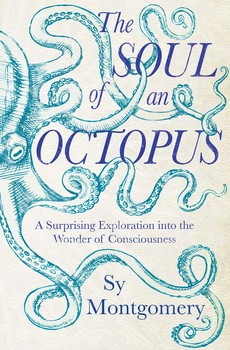 THE SOUL OF AN OCTOPUS
THE SOUL OF AN OCTOPUS
Simon & Schuster, RRP $24.99
May 2015
Hello human… at least, I assume you are a human.* Shall we play a game? I want you to think of ten creatures you consider to be intelligent using whatever parameters you yourself deem intelligence to be defined by.
Alrighty. Done?
Now, I’m going to make some extremely presumptive generalisations here but I’m pretty sure most people will list—maybe even in descending order—our closest primate relatives; other furry creatures with expressive faces and eyes; and cheeky birds. I would presume only a small number of people, maybe those with a personal interest, will have listed anything in the fishy, reptiley, amphibiany section. At the very least the lists will comprise very few, if any, invertebrates. Unless of course there are fans of the 2010 World Cup reading this…
And this makes perfect sense. We assume intelligence increases the closer to human you get, but maybe it’s just convenient and comforting to think so. I might find the intelligence seen in corvids as fascinating and adorable. Others may see it as creepy and, bar the lack of dexterity, a threat to human dominion on earth. But what happens when we see and start to understand remarkable aspects of intelligence in creatures so far removed from us our paths diverged five-hundred million years ago.
If you’re anything like me, you might find tentacles a little bit disconcerting. Or perhaps you belong to that section of the online community who quite enjoy the odd tentacle or two. Either way, when my uncle handed me a bucket containing half a dozen small writhing octopuses and asked me to kill them for dinner I was a little daunted.
Hey, woah. Woah there. Let’s go back a bit.
So, we were on a family trip to Greece, staying at my uncle’s house in a seaside village accessible only by boat or by a narrow donkey path down the cliff to the beach.
I had no idea how to kill an octopus so he showed me how to stick two fingers into the mantle and proceeded to beat the octopus against a nearby boulder. For real. Well, twelve year old me was pleased to be of help, so I set to the task of beating to death the rest of the octopuses. I should probably state here I was quite a pragmatic child.†
This is all a rather morbid way to introduce The Soul of an Octopus. A fascinating look into the world of the octopus and, as the subtitle says, ‘A Surprising Exploration into the Wonder of Consciousness’.
Our main characters are the giant Pacific octopuses living in the New England Aquarium. Through the eyes of the author—naturalist, Sy Montgomery—we meet Athena, Octavia, Kali and Karma.‡ Four grand ladies with their own personalities and temperaments who together show us the different stages in the short life of an octopus: from the curious youngster, to the diligent mother, to the sad inevitability of senescence and death.
Montgomery introduces us to the workings of a public aquarium. Letting us hang out with and get to know the staff and volunteers, all of them drawn there by their love of ocean life. The interactions and relationships between this diverse assortment of humans and their eight-legged (the good kind) charges are remarkable. While we are left with no doubt the depth of love and appreciation this dedicated team hold for the octopuses in their care, what the octopuses get out of their interactions is a mystery. From the behaviours Montgomery encounters we can begin to wonder what play means to an octopus. Why do these solitary creatures appear to invite interspecies interaction? And what level of smug does an octopus feel when stealing a bucket of fish while using her other tentacles to keep everyone distracted?
If you ever questioned whether you’d become emotionally attached to a mollusk, I recommend The Soul of an Octopus to you. Whether that emotion comes from anthropomorphising the squishy suckers (no pun intended) or from connecting with a fellow intelligent creature is difficult to answer.
Maybe it’s a little bit of both.§
* If not, welcome non-human. Where’d you learn how to read English? Or work a computer for that matter?
† I was used to eating meat that I had seen being born, raised, slaughtered, butchered and then grilled with oregano and a touch of salt. My uncle had caught these octopuses. We were to eat them for dinner. In order to do so they must first be one hundred percent less alive. And so I beat them on the boulder. I was dubious and fearful that I was doing something terribly cruel but after the first one I’d perfected the flick and the rest went limp on my second or third whack. Much like boiling lobsters alive, there must be a better way. Back to the octopuses.
‡ With guest appearances from the arowana, the sunflower seastar, and a whole host of supporting artists. Including the humans working and volunteering in the aquarium.
§ Either way, the book doesn’t suck… get it? With the tentacles and the… the cephalopods?


This review makes me want to do two things:
* Read the book and get to know The Girls. Athena, Kali, Octavia, and Karma sound almost pixie-ish in their charms. Hm. What a strange word, I wonder why I used it?
* Buy the reviewer a tea, sit beside her in a Melbourne cafe, and noisily judge people. After all, we have much in common. I too was born from a uterus.
What a lovely unexpected comment on this old thing.
I’m glad you know who you are, dear reader, for you’ve left me NO. CLUES. whatsoever. But I would sit beside you with tea and judgy voice at the ready any day of the week!